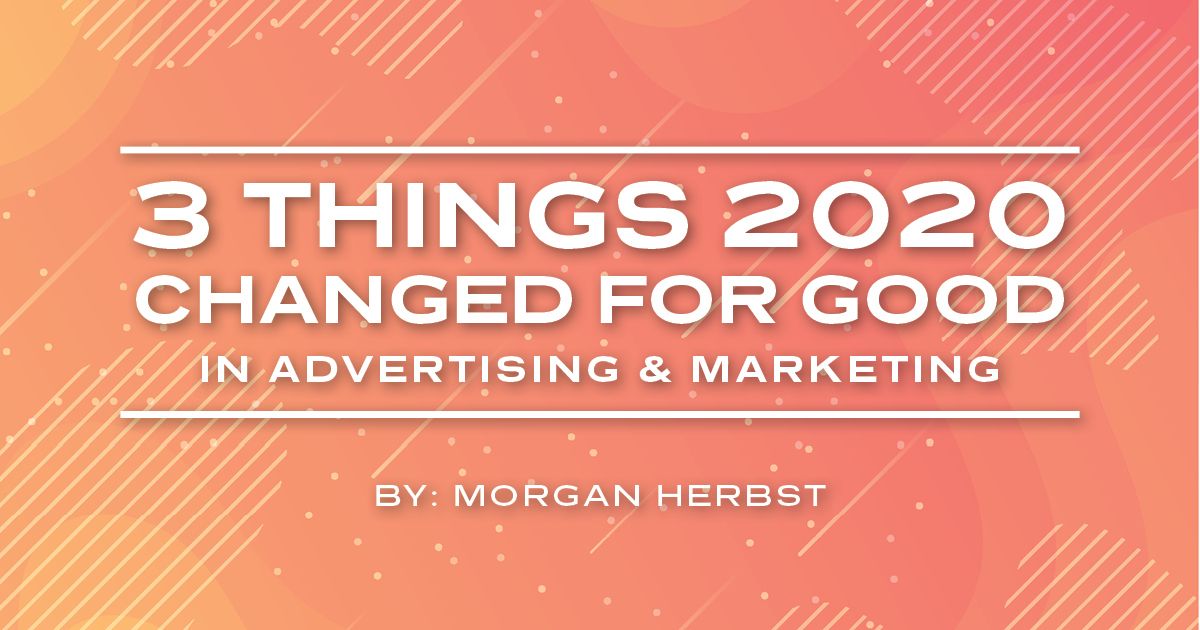This past year was one for the books. Every country, industry, individual, and family experienced unexpected turmoil. On the other hand, most family dogs had their best year yet. I won’t go into the events of 2020, because I assume you were paying attention. If you weren’t, you must not have the internet (and if that’s the case, how are you reading this?).
When big events happen, big changes happen. And sometimes, those changes stick around. 2020 changed a lot of industries, and advertising and marketing is no exception. So without further ado, here are three changes we encountered in 2020 that are here to stay.
1. Activism is expected.
In the past, brands could stay politically neutral. In the politically charged climate of 2020, brands started to make big moves—making their views known about the Black Lives Matter movement, politics, COVID-19 practices, environmental issues, and much more. In the past, tying your brand so closely to social, economic, and political issues was a risk. In 2020, it's to be expected. The fear of controversy has been replaced with widespread activism and wearing your views on your metaphorical sleeve.
Who was there first?
For years, Ben and Jerry’s has been transparent about their politics. Building off the founder’s constant fight for racial, economic, and climate justice, this ice cream company has sections on their website educating consumers about mass incarceration, LGBTQ+ issues, GMO labeling, and more. Ben and Jerry’s has never shied away from controversial or touchy subjects, choosing instead to be loud and proud about what they believe in.
What can I learn from them?
It’s time to take your brand values beyond the boardroom. Consumers expect businesses to stand up for what they believe in. You don’t have to go out and get arrested like Ben and Jerry, but don’t be afraid to publicly support the movements that align with your brand’s values–even if they are controversial.
2. Everything is online.
Yes, the internet is important. Yes, many businesses had e-commerce functionality already. But now, every industry is expected to be online–cars and groceries show up at your door. Your doctor, therapist, and tutor are on facetime. Your fitness class is in your living room. In 2020, every industry made the switch to virtual services and e-commerce out of necessity—but it looks like most of these functions are here to stay.
Who was there first?
Founded in 2012, Carvana is the fastest-growing used-car dealers in the United States–and they do it without brick and mortar. Buying and selling cars has long been an in-person experience, but Carvana customers can shop, finance, and sell or trade-in cars through their website.
What can I learn from them?
No industry is immune to radical change. Buying and selling used cars is something the industry always assumed would be tied to a brick and mortar experience—the act of scouting the lot, test driving cars, meeting with the salespeople to discuss financing—but Carvana saw a way to dramatically change the way it’s all done. And this year it really paid off. Like, 1.12 billion paid off. So even on a small scale, keep modernizing and stay flexible. You never know what big innovation is on its way.
3. Honesty is valued.
Again, honesty was always important when it came to advertising. But with 2020 bringing big challenges, brands began to be more open and honest than ever before about challenges. Suddenly small businesses are openly discussing financial difficulties. Large, established companies are being transparent about their employee protocols and sanitation practices.
Who was there first?
In 2018, two black men were wrongly arrested in a Philadelphia Starbucks. Rather than sweeping the issue under the rug, Starbucks closed more than 8,000 company-owned U.S. stores to conduct racial-bias education. Many appreciated their willingness to accept fault and make significant changes to training and culture. A quick skim of Starbuck’s website shows their candor goes beyond this one instance—everything from employee benefits, bean sourcing, and store sanitation procedures are disclosed fully.
What can I learn from them?
Businesses make mistakes—and when businesses hide their mistakes, it just makes the optics of challenging situations worse. Consumers are smart, and they will doubt the truth behind all a business’s actions if they believe the company is not being transparent. Honesty builds trust and brand loyalty.
It was hard to run a business in 2020—but it forced activism, adaptation, and honesty. And these changes are all certainly for good. There’s a lot to be optimistic about in 2021, and the new year is the perfect time to examine your business. Are you interested in taking your brand to the next level? Contact us.

